One by one, they placed their Olympic gold medals on the chair. Some showed signs of age. Others gleamed brilliantly. They came in all shapes and sizes, most with colorful ribbons attached. Each one marked a point in the history of sport. And every medal represented a lifetime of hard work, sacrifice and achievement.
Since the Olympic Winter Games began in 1924, 31 Americans have won 35 Olympic ski or snowboarding Olympic titles. Nearly two dozen were gathered for the 50th anniversary of the New York Gold Medal Gala, an event that has grown from humble beginnings at Tavern on the Green in 1967 to become a million-dollar fundraiser for the U.S. Ski Team, U.S. Snowboarding and U.S. Freeskiing.
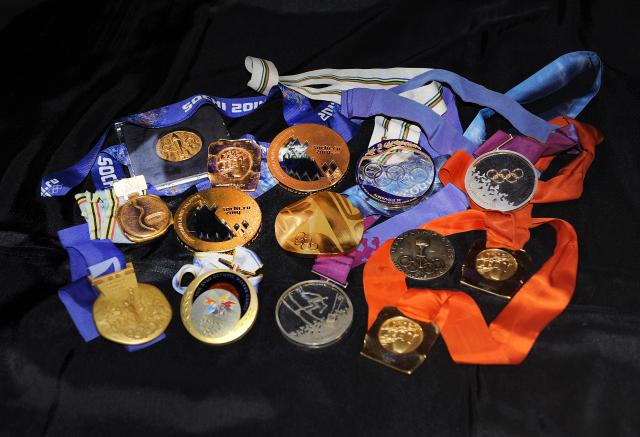
The gold medalists gathered their medals.
As athletes placed their medals onto a black tablecloth, a quiet reverence swept across the stage. Memories came flooding back. Some were choked up as they were struck by the gravity of all of that personal accomplishment documented in one place.
The gold rush didn’t begin for the USA until 1948 when Crystal Mountain-turned-Sun Valley skier Gretchen Fraser won Olympic gold in slalom at St. Moritz. Jeff and Heather Fraser’s minds raced back to childhood with their grandmother as they carefully placed her medal alongside one of Andrea Mead Lawrence’s. Andrea’s daughter, Didi Lawrence, beamed with pride recalling stories of her mother’s double gold in 1952.
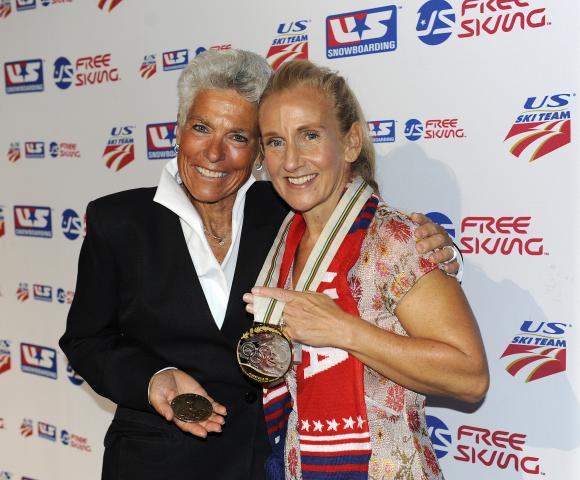
Didi Lawrence and Donna Weinbrecht show off their medals.
Barbara Cochran, part of a great Vermont skiing family, was smiling ear-to-ear as she thought back to that February day at Sapporo in 1972 when a mere two-hundredths of a second brought her gold.
DB Johnson held back tears as she thought back to that storybook 1984 season when her son Bill won the Olympic downhill. He passed away just this past January. It was a reunion, of sorts, on that stage as Johnson’s gold was flanked by those of Deb Armstrong and Phil Mahre – a stunning Olympics for America 32 years ago in Sarajevo.
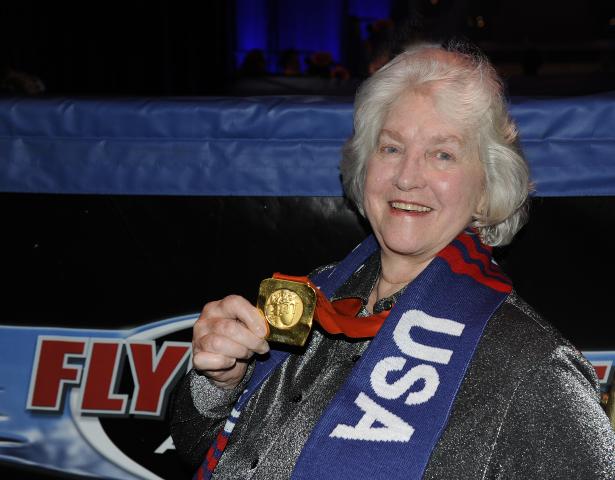
DB Johnson displays her son's gold medal.
One of the first to gingerly place her gold medal was Donna Weinbrecht, the Jersey girl who became her sport’s first Olympic champion with her daffy-twister-spread to win moguls gold on the slopes of Tignes, France in 1992.
There were the medals from Lillehammer in 1994 – Tommy Moe and Diann Roffe. Moe still has that gleam in his eye, the same one that greeted First Lady Hillary Clinton who shook his hand in the finish. A few days later, Roffe started number one in the super G setting a time that no one could beat.
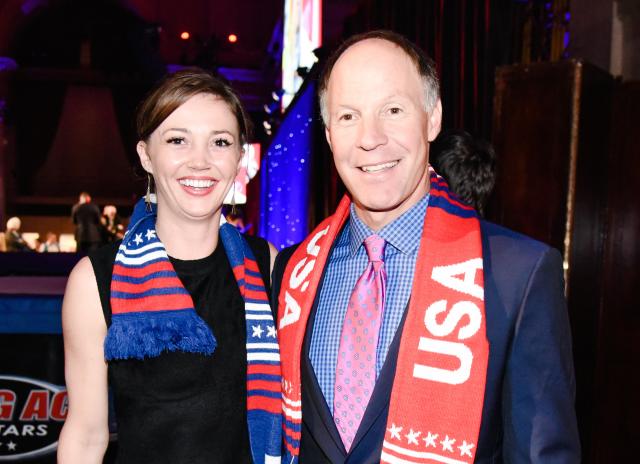
Tommy Moe and Kaitlyn Farrington smile.
Freestyle aerialist Eric Bergoust thought back to the historic day in 1998 at Nagano when he combined with Nikki Stone to sweep gold, his father at his side. It was a long way from those days as a kid jumping off his parents’ roof. A week earlier, California boy Jonny Moseley found fame when he struck gold with his trademark 360 mute grab.
Ross Powers’ mind raced back to that crazy day in Park City nearly 15 years ago when he led a podium sweep with halfpipe snowboarding gold – just like Joss Christensen did in 2014 at Sochi at the debut of slopestyle skiing. Seth Wescott, one of four Americans to have won two gold medals, was struck by the magic of winning back-to-back gold in his sport of snowboardcross’ first two Olympics in 2006 and 2010.
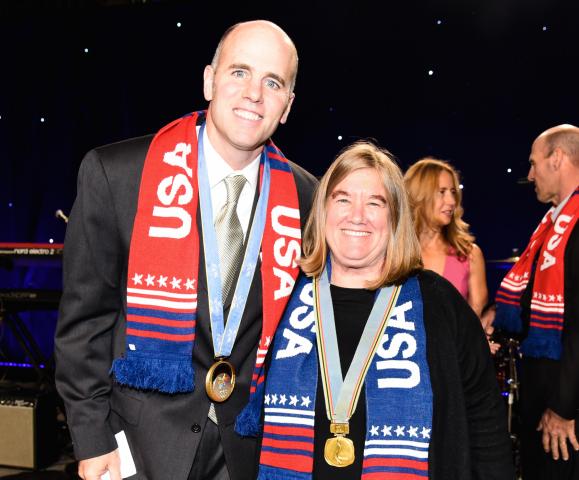
Eric Bergoust and Barbara Cochran hang their gold medals around their necks.
Hannah Kearney reflected on the note her trainer gave her on the eve of her 2010 moguls gold, chronicling all of the squats, pull-ups, dead lifts and more she had done to prepare for that day.
Sochi medal colleagues were reunited, including David Wise and Kaitlyn Farrington who took halfpipe skiing and snowboarding gold, as well as an energized Jamie Anderson who won the first-ever slopestyle snowboarding title.
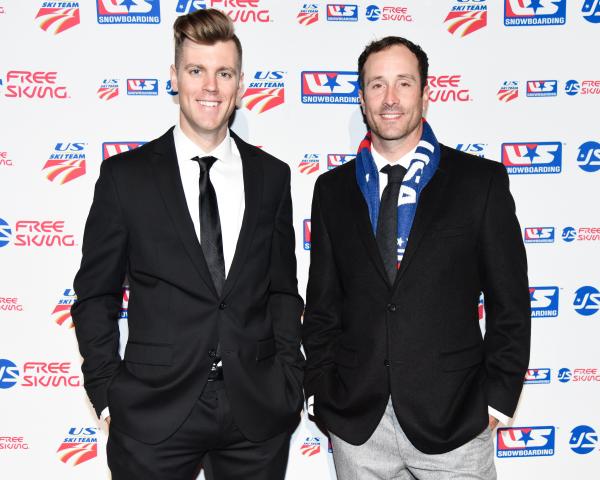
Alex Deibold and Seth Wescott pose.
As the last of the medals was placed, the stage became quiet. Hearts raced silently. Soon athletes were clamoring for photos to document the historical gathering of medals that all happened quite organically.
There were no fans or supporters on the stage, only gold medalists. They looked around at each other and exchanged stories. You could see in their eyes the passion they felt for their personal accomplishment, and the kinship they shared with one another.
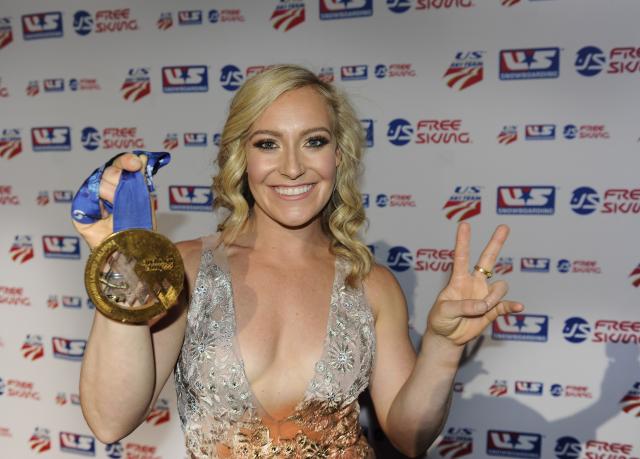
Jamie Anderson grins with her gold medal.
The glimmering gold medals represented many things – hard work, sacrifice, sweat and tears. Most of all, though, they represented dreams – childhood aspirations that became a reality.
Later that evening, Phil Mahre spoke to the 800 supporters gathered at New York’s Cipriani Wall Street. His eloquent words detailed his medal afternoon in Sarajevo – closing day of the 1984 Games. He talked about the battle between he and brother Steve, who would win silver, and how he received news of the birth of his son that day back home.
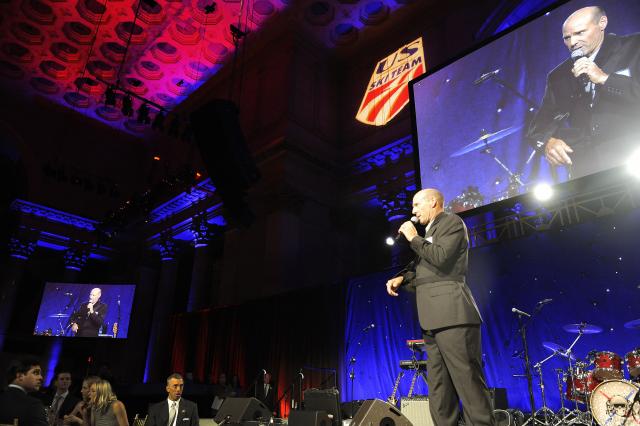
Phil Mahre speaks to the crowd.
His voice broke as he detailed his podium experience.
“I thought about what a great day this was for my brother Steve and I,” he said. “But when the anthem played and the flag rose, I realized it wasn’t about us at all. It was about all the people who helped us get here.”
Reaching to the gold medal around his neck he said, “It struck me that day, that this wasn’t my medal at all.
“This was America’s gold medal.”
